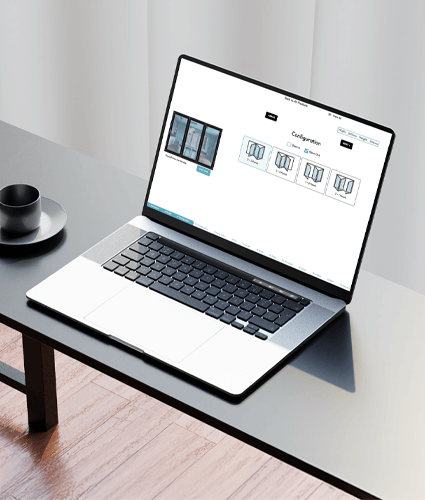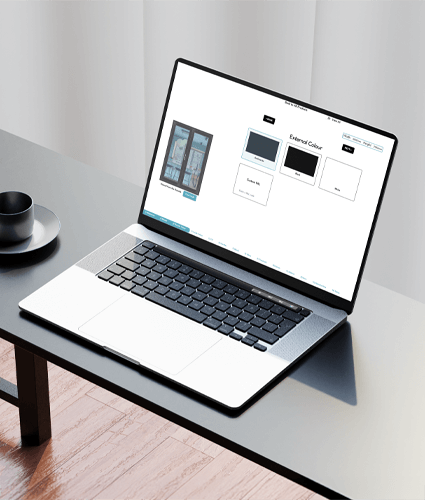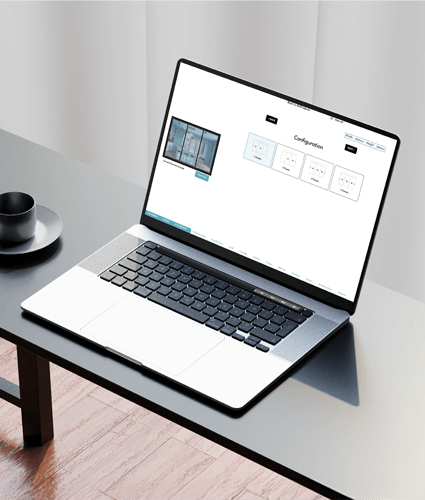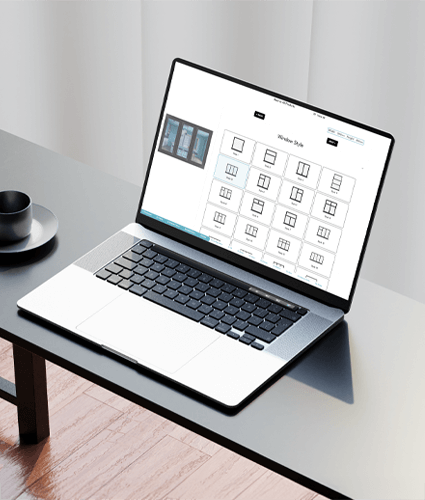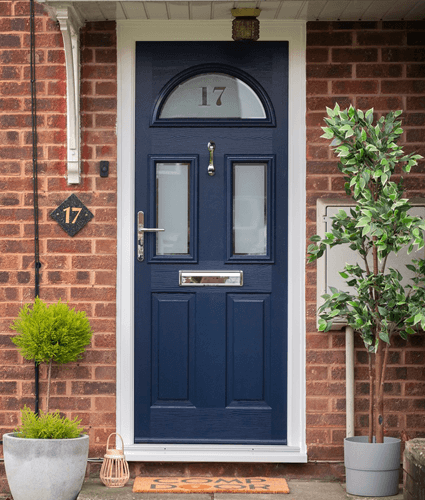The Ultimate Guide: uPVC vs Aluminium Windows
The ongoing debate between uPVC v aluminium windows has been a long-standing one, and finding a clear resolution isn’t straightforward. Each material offers its own set of benefits and drawbacks, and the best choice often depends on the specific circumstances of your property.
For many homeowners, this can be a challenging decision to navigate. To simplify this process, we aim to highlight the key advantages and disadvantages of both types of windows, helping you make an informed decision that suits your needs and preferences.
Understanding Aluminium Windows
Aluminium windows are a type of window featuring aluminium frames and glass panes. They are well-regarded for their durability, strength, and resistance to corrosion, making them suitable for various types of buildings, including residential homes, offices, and commercial properties.
These windows are lightweight and require minimal maintenance, offering a cost-effective option over time. With a variety of styles, designs, and finishes available, aluminium windows provide great flexibility in both aesthetics and functionality.
In terms of performance, aluminium windows offer good thermal and acoustic insulation, making them energy-efficient and soundproof. This combination of benefits makes aluminium windows a popular choice for those seeking a modern and practical window solution.
The Top Benefits of Aluminium Windows
- Increased Durability and Strength: Aluminium windows are renowned for their robustness, providing a long-lasting solution for your home.
- Minimal Maintenance Required: These windows are incredibly easy to care for, needing just occasional cleaning to keep them looking their best.
- Energy Efficiency: Aluminium windows with thermal breaks offer superior insulation, helping to reduce energy bills.
- Aesthetically Pleasing: Available in a variety of styles and finishes, aluminium windows can enhance the look of any property.
- Effective Soundproofing: They provide excellent noise insulation, making them ideal for homes in busy areas.
- Environmentally Friendly: Aluminium is a recyclable material, making it an eco-friendly choice.
- Enhanced Security: With strong frames and secure locking mechanisms, aluminium windows offer improved security.
- Manufactured in Large Sizes: Aluminium windows can support larger panes of glass, allowing for expansive views and more natural light.
Lifespan of Aluminium Windows – How long do aluminium last?
Aluminium windows are celebrated for their exceptional durability and long lifespan. Typically, they can last between 30 to 45 years. This impressive longevity is attributed to aluminium’s resistance to rust, corrosion, and its ability to endure harsh weather conditions.
Moreover, with proper installation and regular maintenance, their lifespan can be further extended, making them a resilient choice for both residential and commercial properties.
Understanding uPVC Windows
uPVC (unplasticised polyvinyl chloride) windows are constructed with uPVC frames and glass panes. They are a popular alternative to traditional windows due to their low maintenance requirements, energy efficiency, and affordability.
uPVC windows are highly durable, weather-resistant, and provide excellent thermal insulation. Available in various styles and finishes, they can be customised to match the aesthetics of any building. Additionally, uPVC windows can be equipped with secure locking systems, enhancing their security. Overall, uPVC windows are a practical and widely-used window solution with numerous benefits for homeowners and building managers.
Benefits of uPVC Windows
- Low Maintenance: Requires minimal upkeep.
- Energy Efficiency: Excellent insulation properties.
- Affordability: Cost-effective compared to other materials.
- Enhanced Durability: Long-lasting and robust.
- Aesthetic Appeal: Available in various styles and finishes.
- Soundproofing: Effective at reducing outside noise.
- Eco-Friendly: Recyclable and sustainable.
- Enhanced Security: Can be fitted with secure locking systems.
- Moisture Resistance: Resistant to moisture, preventing issues like rot and mold.
Lifespan of uPVC Windows
uPVC windows are celebrated for their durability and low maintenance. On average, they last between 20 to 35 years. The lifespan of uPVC windows can vary based on factors such as the quality of the material, the installation process, and the climate conditions they are exposed to. Additionally, uPVC’s resistance to rot, rust, and corrosion contributes significantly to its longevity, making it a popular choice among homeowners.
The Difference Between Aluminium and uPVC Windows
Aesthetic Considerations: uPVC vs Aluminium
The style of your property significantly influences the type of windows you choose. Factors such as the age of your property, its location, and its value will play a crucial role in your decision.
For properties with a contemporary feel, aluminium windows might be the ideal choice, offering a sleek and elegant edge. Conversely, for listed buildings or properties situated in conservation areas, uPVC windows are often the preferred option.
When deciding on the right windows, consider the surroundings of your building and the style that would best complement its location. Ensuring that the windows allow ample natural light into your property and harmonise with both the interior and exterior is vital.
Additionally, it’s important to remember that both aluminium and uPVC window frames come in various colours, offering a high level of customisability to help you create the desired aesthetic. Choose the window style that best suits your property’s characteristics for a cohesive look.
Verdict: When weighing uPVC vs aluminium windows for aesthetics, always consider the unique attributes of your house.
uPVC vs Aluminium: Pricing
Due to manufacturing costs and the nature of the materials, installing aluminium windows is generally more expensive than uPVC. However, aluminium’s durability often makes it a more cost-effective choice in the long run, as they typically don’t need replacing as often as uPVC windows.
For those who prefer a more affordable initial investment, uPVC windows are an excellent option. They not only cost less than aluminium windows but also boast a long lifespan. Combined with their high resistance to rot, uPVC windows are ideal for medium-sized properties where budget and maintenance are key considerations.
Choosing different window types and styles can also impact costs. For example, a standard casement aluminium window might start at an average of £500, whereas a typical uPVC window could start at around £200. Remember, window prices can fluctuate based on various factors, so it’s important to consider all aspects when making your decision.
Verdict: While uPVC windows are cheaper initially, aluminium windows offer greater durability and long-term value.
uPVC vs Aluminium: Maintenance
When it comes to maintaining uPVC and aluminium windows, there’s little difference: both materials are incredibly sturdy and durable, with no tendency to rot or warp, and both require minimal maintenance overall.
Both types are also easy to clean and care for, needing just a cloth and a bucket of warm soapy water to keep them looking pristine. With proper care, you won’t need to replace your windows for a long time.
Verdict: In terms of maintenance, both uPVC and aluminium windows are very easy to care for!
uPVC vs Aluminium: Energy Efficiency
For many years, uPVC has been heralded as an excellent insulator, with many uPVC windows boasting high thermal efficiency. Conversely, aluminium windows were once believed to provide less insulation than their uPVC counterparts, leading some to think double or triple glazing was necessary. However, recent advancements have debunked this myth, showing that while aluminium frames may feel cooler to the touch, their heat retention is just as effective.
With the progression of technology, aluminium windows have become just as energy-efficient as uPVC. Aluminium is naturally more conductive, allowing heat to pass through easily. However, modern manufacturers often incorporate Aerogel into their frames—especially in new constructions—to enhance insulation. Aerogel, used in spacesuits and shuttles, creates a thermal break between the glass panes.
In summary, both aluminium and uPVC windows offer comparable levels of insulation. To ensure you get the most energy-efficient windows, check the Window Energy Rating (WER) before making a purchase, regardless of the brand, style, or material.
Verdict: When considering uPVC vs aluminium windows for energy efficiency, both options can save you money on your energy bills if you choose the right supplier.
uPVC vs Aluminium: Durability
Since the 1980s, uPVC has been a highly effective and popular choice for window frames. Known for its physical strength, uPVC does an excellent job at resisting rot over long periods of time. Additionally, uPVC frames require very little maintenance, which greatly adds to their appeal. However, like any material, uPVC frames tend to degrade after about 30 years and will eventually need replacing.
On the other hand, high-quality aluminium frames can last up to 50 years or even longer. What sets aluminium apart is its resistance to rust, meaning the frames won’t suffer from rust damage over time. Aluminium frames do not degrade in the same way as uPVC frames, ensuring a longer lifespan.
Verdict: When considering durability, both uPVC and aluminium windows are weather-resistant and durable. Aluminium windows can last up to 50 years, while uPVC windows typically last up to 30 years.
uPVC vs Aluminium: Security
One notable advantage of uPVC windows over aluminium windows is their superior soundproofing ability. While aluminium windows are effective at reducing noise, uPVC windows tend to block out even more sound, contributing to a quieter and safer home environment.
Both uPVC and aluminium windows are recognized for their durability and strength, ensuring that whichever you choose, your windows will be secure. Both types are significantly more robust than timber windows, which are more prone to rot and breakage over time.
Regardless of the material, it’s advisable to invest in windows with high-quality locks. Modern locking mechanisms will enhance the security of your windows and property, providing peace of mind that your home is well-protected against potential intruders.
Verdict: In terms of security, both uPVC and aluminium windows offer reliable protection for your home!
Is uPVC More Expensive than Aluminium?
The cost of uPVC (unplasticized polyvinyl chloride) and aluminium windows and doors can vary depending on factors such as quality, size, style, and location.
Generally, uPVC tends to be less expensive than aluminium. This is because uPVC is cheaper to produce and install, whereas aluminium requires more complex manufacturing processes.
However, aluminium is a more durable and long-lasting material, which can make it a more cost-effective option in the long run. Ultimately, the cost difference between uPVC and aluminium will depend on individual circumstances and preferences.
Is uPVC More Expensive than Aluminium?
The cost of uPVC (unplasticized polyvinyl chloride) and aluminium windows and doors can vary depending on factors such as quality, size, style, and location.
Generally, uPVC tends to be less expensive than aluminium. This is because uPVC is cheaper to produce and install, whereas aluminium requires more complex manufacturing processes.
However, aluminium is a more durable and long-lasting material, which can make it a more cost-effective option in the long run. Ultimately, the cost difference between uPVC and aluminium will depend on individual circumstances and preferences.
Understanding Condensation with Aluminium Windows
Aluminium windows themselves do not directly cause condensation. Condensation occurs when warm, moist air meets a colder surface, causing the moisture in the air to form water droplets.
However, aluminium windows can contribute to condensation if they are not properly insulated or if they allow cold air to enter the building. When window frames are colder than the indoor air, they create a surface where moisture can condense. To prevent condensation on aluminium windows, it’s crucial to ensure proper ventilation, insulation, and regular maintenance.
Choosing the Best Windows for Your Home
The decision between aluminium and uPVC windows for a house hinges on several factors, including budget, style, durability, and energy efficiency.
uPVC Windows:
- Affordable: uPVC windows are generally more budget-friendly.
- Energy-Efficient: They provide excellent thermal insulation, helping to reduce energy costs.
- Low-Maintenance: uPVC windows require minimal upkeep.
- Durability: While durable, they may not be as long-lasting as aluminium.
Aluminium Windows:
- Strength and Durability: Aluminium windows are known for their robustness and long lifespan.
- Weather-Resistant: They can withstand harsh weather conditions without rusting or corroding.
- Aesthetic Appeal: Aluminium windows offer a sleek, modern look with slim frames.
- Higher Cost: They are more expensive upfront but can be more cost-effective over time.
- Energy Efficiency: While traditionally less energy-efficient, modern aluminium windows with thermal breaks offer competitive insulation.
Ultimately, the best windows for your home will depend on your specific preferences and requirements. Evaluate your needs in terms of budget, desired aesthetic, and long-term benefits to make an informed decision.
Conclusion: uPVC vs Aluminium Windows
It’s evident that both uPVC and aluminium windows come with their own sets of pros and cons, and it’s not easy to declare one as definitively superior to the other. When choosing windows for your property, it’s crucial to select the option that best meets your priorities and personal preferences. With so many factors to consider, the debate over which material is better will likely continue.
If you’re still unsure about which type of window to choose, consider reaching out to a trusted window specialist. They can provide quotes, answer questions, and offer expert advice to help you find the best solution for your home.

